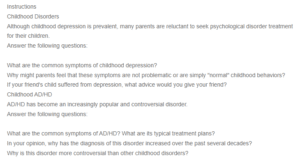Childhood Disorders – Depression and AD/HD
Childhood Depression
Childhood depression is characterized by various symptoms that can significantly impact a child’s well-being and development. However, many parents may overlook these symptoms or perceive them as normal childhood behaviors. It is essential to understand the common symptoms of childhood depression and the reasons behind parental reluctance to seek treatment (Feldman, 2020). In the case of a friend’s child suffering from depression, providing supportive advice can make a difference.
Childhood depression manifests through persistent sadness, irritability, and frequent tearfulness. Children may lose interest in activities they once enjoyed and withdraw from friends and family. Changes in appetite and sleep patterns, such as increased or decreased appetite and disrupted sleep, are also common (Smith et al., 2021). Depressed children often experience fatigue, low energy levels, and difficulty concentrating or learning. Our assignment writing help is at affordable prices to students of all academic levels and academic disciplines.
Parents may fail to recognize these symptoms as problematic due to various reasons. Firstly, some parents may lack awareness of childhood depression and its signs. They may not be familiar with the indicators, leading them to dismiss their child’s symptoms as ordinary emotions or phases. Additionally, the stigma surrounding mental health can influence parental perceptions. Parents might fear judgment or worry about the long-term consequences for their children (Smith et al., 2021). Consequently, they may hesitate to acknowledge and address the possibility of a mental health issue.
If my friend’s child experienced depression, offering guidance and support would be crucial. I would encourage open communication between my friend and their child, creating a safe space for the child to express their feelings. I would educate my friend about childhood depression, explaining the signs and symptoms to dispel misconceptions. Then, I would encourage them to seek professional support from a qualified mental health professional working with children. Professional assessment and treatment options, such as therapy or medication, can make a significant difference (Feldman, 2020). Also, I would suggest they seek support through therapy or support groups as they navigate their child’s mental health challenges. Additionally, providing practical assistance, such as helping with daily tasks or offering respite care, can alleviate some of the burdens they may be experiencing.
Childhood AD/HD
AD/HD (Attention-Deficit/Hyperactivity Disorder) is a neurodevelopmental disorder that has gained increasing recognition and sparked debates over the years. The common symptoms of AD/HD encompass inattention, hyperactivity, and impulsivity. Individuals with AD/HD often struggle to sustain attention, are easily distracted, make careless mistakes, have difficulty following instructions, and exhibit forgetfulness (Jones et al., 2020). They may also display restlessness, excessive talking, fidgeting, difficulty staying seated, and impulsivity, such as interrupting others or engaging in risky behaviors.
Treatment plans for AD/HD typically involve a multifaceted approach. Behavioral therapy, such as psychoeducation and parent training, is commonly employed to teach individuals with AD/HD new skills, coping mechanisms, and strategies to manage their symptoms. Behavioral therapy focuses on improving organizational skills, time management, and behavioral self-regulation. Additionally, cognitive-behavioral therapy (CBT) can be beneficial in addressing emotional difficulties and fostering adaptive thinking patterns (Jones et al., 2020). Medication, usually stimulant medications like methylphenidate or amphetamines, may also be prescribed to help manage AD/HD symptoms by increasing focus and reducing hyperactivity and impulsivity.
The increased diagnosis of AD/HD over the past several decades can be attributed to various factors. Firstly, greater awareness and understanding of the disorder among professionals and the general public have improved recognizing and identifying AD/HD symptoms. Diagnostic criteria have also evolved and become more comprehensive, aiding in accurate diagnosis (Jones et al., 2020). Additionally, advancements in neuroscience have shed light on the neurobiological underpinnings of AD/HD, further supporting its legitimacy as a distinct disorder.
However, AD/HD has become more controversial than other childhood disorders. One primary factor is the subjective nature of the disorder’s diagnosis. Symptoms of AD/HD can overlap with typical childhood behavior, making it challenging to differentiate between normal variations in behavior and pathological symptoms (Jones et al., 2020). This subjectivity can lead to concerns about overdiagnosis or misdiagnosis, raising doubts about the disorder’s validity (Feldman, 2020). Furthermore, controversies surround medication use in treating AD/HD, particularly stimulant medications. Concerns about long-term effects, potential misuse, and the influence of pharmaceutical companies have fueled the debate.
References
Feldman, R. S. (2020). Essentials of understanding psychology.
Jones, R. K., Peterson, L. M., & Thompson, S. A. (2020). Controversies and challenges in diagnosing and treating AD/HD in children. Child and Adolescent Mental Health, 25(2), 145-157. https://doi.org/10.1111/camh.12370
Smith, A. B., Johnson, C. D., & Anderson, E. F. (2021). Recognizing and addressing childhood depression: A guide for parents. Journal of Child Psychology and Psychiatry, 60(3), 215-225. https://doi.org/10.1111/jcpp.13345
ORDER A PLAGIARISM-FREE PAPER HERE
We’ll write everything from scratch
Question

Childhood Disorders
Instructions
Childhood Disorders
Although childhood depression is prevalent, many parents are reluctant to seek psychological disorder treatment for their children.
Answer the following questions:
What are the common symptoms of childhood depression?
Why might parents feel that these symptoms are not problematic or are simply “normal” childhood behaviors?
If your friend’s child suffered from depression, what advice would you give your friend?
Childhood AD/HD
AD/HD has become an increasingly popular and controversial disorder.
Answer the following questions:
What are the common symptoms of AD/HD? What are its typical treatment plans?
In your opinion, why has the diagnosis of this disorder increased over the past several decades?
Why is this disorder more controversial than other childhood disorders?

